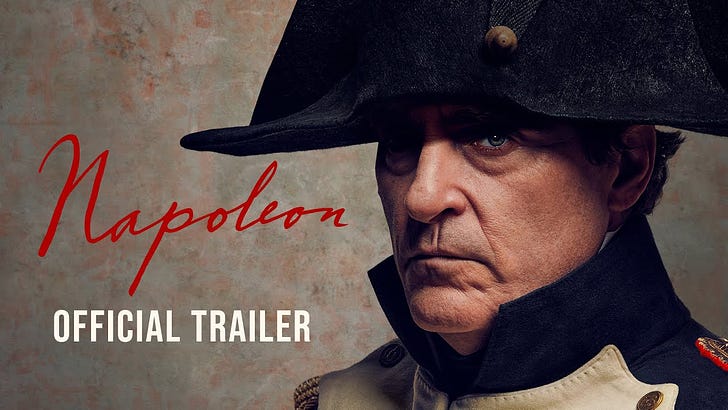Napoleon the movie: a native's perspective (repost)
Not a single word of French is spoken in Ridley Scott's epic - that's a good thing.
Napoleon is loosely based on the life of the general-turned-emperor of that name. The plot focuses on the relationship between the title character and a woman who cannot give him an heir. It follows the ups and downs of a passionate marriage, interspersed with battle scenes.
If you like costumed romance and the roar of cannon fire, this film is for you. There is no ponderous discussion of military tactics or grand diplomatic strategy to spoil your fun.
As someone who finds it easier to understand affairs of the state than those of the heart, I didn’t enjoy the movie as much as others might. One thing I did appreciate, though, was the way it handled language.
The protagonists, like the historical figures that distantly inspired them, are French. I always wince when foreign characters are made to speak in accented English. As I was sitting down to see Napoleon, there was a trailer for a biopic about the carmaker Enzo Ferrari that featured fake Italians sounding like the guy who sang Shaddap You Face.
What bothers me most in such a gimmicks is not the fake accent; it’s the confusion of foreignness with exoticism. The two are in fact antithetical. When people from another country talk among themselves they don’t sound exotic to each other. Portraying a character as a funny foreigner has the literally alienating effect of establishing distance with the viewer. This may work for comedies like ‘Allo ‘Allo! or The Pink Panther series, but not for a supposedly serious drama.
Napoleon does not fall into that trap. The cast does not include a single native speaker. Some French critics cried foul, but that is just as ridiculous as insisting that any production of Corneille’s Le Cid should include Spanish actors.
The fact that all the characters in Napoleon have impeccably American or British accents should be welcomed. There is no cognitive dissonance there. Everyone understands that England is the actual enemy. High-flying tricolores and crowds shouting “Long live France!” (not, thankfully, a bad rendition of Vive la France!) are there to dispel any lingering notion that just because actors speak BBC English, the people they play must be born and bred in the Home Counties.
So full marks to the director of Napoleon — an Englishman — for taking a linguistic stand. He even has his fictional emperor get his news through British newspapers. More daringly still, the act of separation signed by the ill-starred spouses is shown as written in English. That detail may seem gratuitous: you don’t need to be able to read the text to understand what is going on (the husband is sacrificing his marriage to higher interests.)
But by inserting a close-up of the document with words like “empress” and “my country” (as opposed to impératrice and mon pays) the director says: “This is an English-language film. I’m not going to inject spurious verisimilitude by having characters speak one language and write in another. Such contrived mixing and matching would be an insult to audiences.”
This defiance of Hollywood convention, of course, is not enough to make me recommend the film to everyone. Those who share my lack of enthusiasm for love stories or war movies may find little comfort in it. Mais je pensais que ça valait le coup de saluer la chose.
(This is a slightly edited version of my Medium post “Napoleon, Film Review”, 30 November 2023.)


